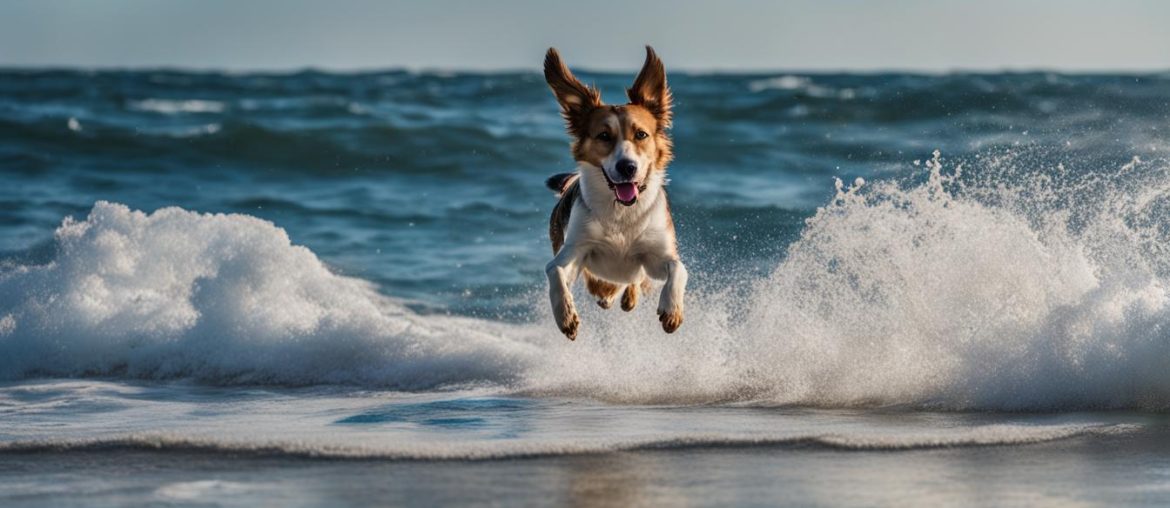When it comes to swimming in saltwater, many dog owners wonder if it’s safe for their furry friends. While the beach and ocean waves can be exciting for both dogs and humans, be aware of the potential harm that saltwater can cause to dogs.
Dogs drinking salt water can experience various health effects, ranging from mild discomfort to severe illness. Consuming large amounts of saltwater can lead to diarrhea, vomiting, and dehydration in dogs. It can disrupt the fluid balance in their bodies, causing further complications.
In this article, we will explore the risks of saltwater swimming for dogs, the symptoms of saltwater poisoning, and how to prevent any potential harm. Let’s dive into the facts and uncover the truth about swimming in saltwater for dogs.
Key Takeaways:
- Swimming in saltwater can be harmful to dogs due to the risks of saltwater poisoning and dehydration.
- Consuming excessive amounts of saltwater can lead to diarrhea, vomiting, and disruption of fluid balance in dogs.
- Saltwater poisoning in dogs can cause seizures, brain cell loss, kidney injury, and severe dehydration.
- Immediate veterinary treatment is crucial if a dog has consumed a toxic amount of saltwater.
- Preventive measures, such as providing fresh water, limiting saltwater exposure, and monitoring dogs at the beach, can help keep them safe and healthy.
Risks of Saltwater Swimming for Dogs
When it comes to dogs swimming in saltwater, there are several potential risks and health effects to consider. Saltwater can be harmful to dogs if they consume it in excessive amounts. The high salt content can lead to dehydration, diarrhea, and vomiting. Ingesting sand along with saltwater can further damage a dog’s intestines, causing additional health issues.
Another risk of saltwater swimming for dogs is the potential for them to accidentally swallow bacteria, algae, or toxins present in the water. This can result in various illnesses and health complications for the dogs later on. You might want to limit a dog’s exposure to saltwater and prevent them from ingesting it to mitigate these risks.
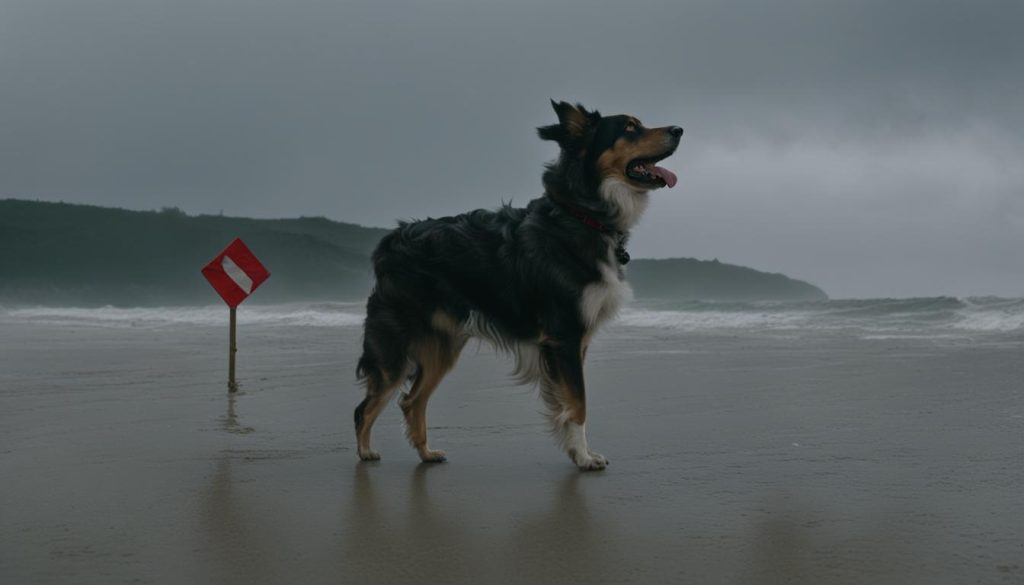
In summary, the risks of saltwater swimming for dogs include dehydration, gastrointestinal issues, and exposure to harmful bacteria or toxins. I recommend for dog owners to be aware of these risks and take necessary precautions to keep their furry friends safe while enjoying the water.
Symptoms of Saltwater Poisoning in Dogs
When dogs consume excessive amounts of saltwater, it can lead to various symptoms that should not be ignored. Recognizing the signs of saltwater poisoning is crucial in order to seek prompt veterinary care. Some common symptoms to look out for include:
- Vomiting: Dogs may start vomiting within hours of ingesting saltwater. This can be a key indication of saltwater poisoning.
- Weakness: Severe cases of saltwater poisoning can cause weakness in dogs. They may appear lethargic and lack energy.
- Diarrhea: Dogs may experience diarrhea as a result of consuming saltwater. You should monitor their bowel movements for any changes.
- Muscle tremors: Tremors in the muscles can be another symptom of saltwater poisoning. Dogs may exhibit uncontrollable shaking or twitching.
- Seizures: In severe cases of saltwater poisoning, dogs may experience seizures. This can be a life-threatening condition and requires immediate medical attention.
- Odd behavior: Dogs with saltwater poisoning may exhibit strange or abnormal behavior. They may appear confused, disoriented, or non-responsive.
If you notice any of these symptoms in your dog after swimming in saltwater, you should contact your veterinarian for guidance. Early detection and treatment can significantly improve the dog’s chances of recovery.
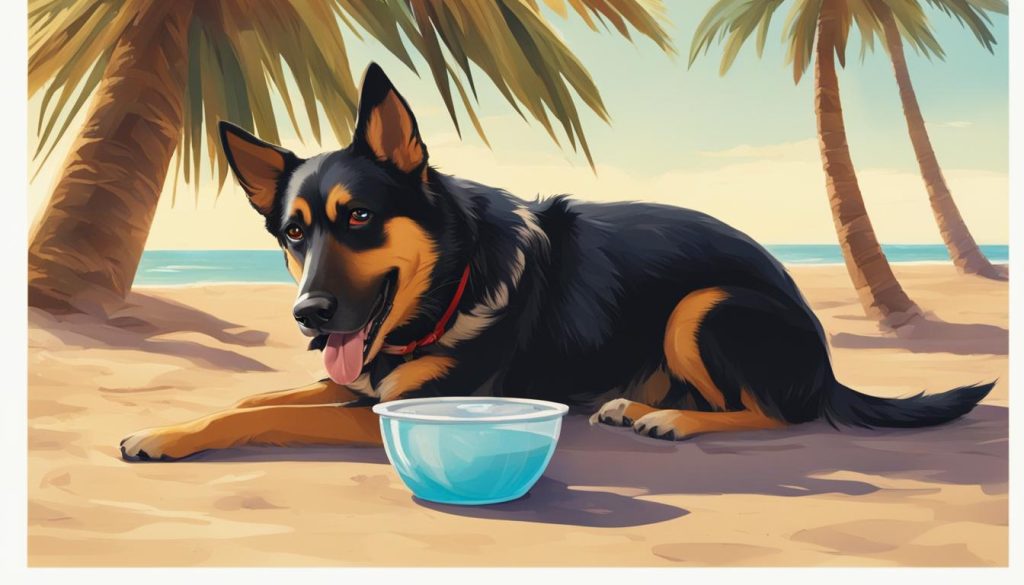
Table: Symptoms of Saltwater Poisoning in Dogs
| Symptoms | Description |
|---|---|
| Vomiting | Dogs may vomit within hours of ingesting saltwater |
| Weakness | Dogs may appear lethargic and lack energy |
| Diarrhea | Dogs may experience loose or watery bowel movements |
| Muscle tremors | Dogs may exhibit uncontrollable shaking or twitching of the muscles |
| Seizures | In severe cases, dogs may experience seizures |
| Odd behavior | Dogs may appear confused, disoriented, or non-responsive |
Treating Saltwater Poisoning in Dogs
Saltwater poisoning in dogs can be a serious medical emergency that requires prompt veterinary treatment. The initial approach aims to restore the water and electrolyte balance in the dog’s body, which has been disrupted by the excess salt intake. This typically involves the administration of intravenous (IV) fluids to flush out the excessive salt and rehydrate the dog. Monitoring electrolyte levels is crucial during the treatment process to ensure proper balance is maintained.
In cases where the dog has experienced brain swelling or seizures due to saltwater poisoning, additional treatment may be necessary. Medications may be prescribed to control seizures and reduce brain swelling, while supportive care, such as providing a calm and comfortable environment, can help the dog recover.
The recovery period for saltwater poisoning in dogs can vary depending on the severity of the poisoning and the individual dog’s response to treatment. In most cases, hospitalization for 2-3 days is recommended to closely monitor the dog’s condition and provide necessary care. Regular check-ups with the veterinarian after discharge may also be advised to ensure continued recovery and the absence of any long-term complications.
Treating Saltwater Poisoning in Dogs: Summary
- Veterinary treatment involves restoring the water and electrolyte balance through IV fluid administration.
- Monitoring electrolyte levels is crucial to maintain proper balance during treatment.
- Additional treatment may be necessary for brain swelling and seizures.
- Supportive care, such as a calm environment, aids in the dog’s recovery.
- Recovery time varies and may require 2-3 days of hospitalization.
- Regular check-ups with the veterinarian are recommended after discharge.
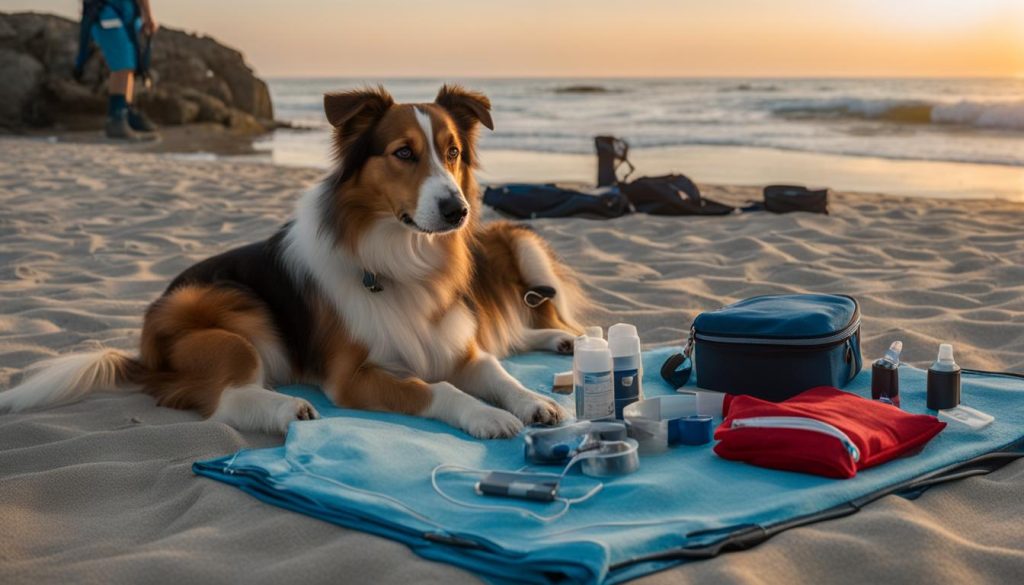
Preventing Saltwater Poisoning
When it comes to keeping your furry friend safe at the beach, preventing saltwater poisoning is crucial. By taking a few simple precautions, you can ensure that your dog has a fun and safe experience in the water.
Providing Fresh Water
One of the key steps in preventing saltwater poisoning is providing your dog with access to fresh water at all times. By offering a separate water bowl filled with clean, freshwater, you can help satisfy your dog’s thirst and prevent them from drinking salt water.
Limiting Saltwater Exposure
While swimming in saltwater can be enjoyable for dogs, limit their exposure and prevent them from ingesting excessive amounts of salt water. Taking regular breaks from swimming and offering shade can help reduce the temptation to drink saltwater. Additionally, keeping a close eye on your dog and promptly redirecting them away from the water if they attempt to drink it can help safeguard their health.
Observation and Hydration
Being observant of your dog’s behavior is essential in preventing saltwater poisoning. Signs of excessive thirst, odd behavior, or any symptoms of saltwater poisoning should be taken seriously. Offering your dog regular fresh water breaks and ensuring they don’t drink excessively from freshwater sources can help maintain their hydration levels and mitigate the risk of saltwater poisoning.
| Preventive Steps | Benefits |
|---|---|
| Providing access to fresh water | Prevents dehydration and reduces the dog’s desire to drink saltwater |
| Limiting saltwater exposure | Reduces the risk of ingesting harmful levels of saltwater |
| Observing dog’s behavior | Enables early detection of symptoms and prompt action to prevent saltwater poisoning |
By following these preventive steps, you can prioritize the well-being of your furry friend and ensure they have a safe and enjoyable experience while swimming in saltwater.
Risks of Blue-Green Algae Poisoning
Blue-green algae, also known as cyanobacteria, can pose significant risks to dogs when present in non-flowing freshwater environments such as lakes and ponds, particularly during hot seasons. I recommend that you be aware of the potential harm and take precautions to protect our furry friends.
The bacteria can release toxins that are harmful to dogs, and if dogs come into contact with or ingest these toxins, it can lead to blue-green algae poisoning. This can cause various health issues such as liver damage, neurological problems, respiratory distress, and even death.
Therefore, it is good practice to be cautious when allowing dogs near freshwater bodies that might contain blue-green algae. Dogs should not drink directly from lakes or ponds, especially if there are visible signs of algae or if the water has a strong odor or an unusual color. If there is any suspicion of contact with toxins, it is advisable to immediately rinse off the dog with clean water and seek veterinary assistance.
| Signs and Symptoms of Blue-Green Algae Poisoning in Dogs | Treatment and Prevention |
|---|---|
|
|
Being vigilant about the presence of blue-green algae and taking necessary precautions can help keep our canine companions safe and prevent the risks associated with blue-green algae poisoning.
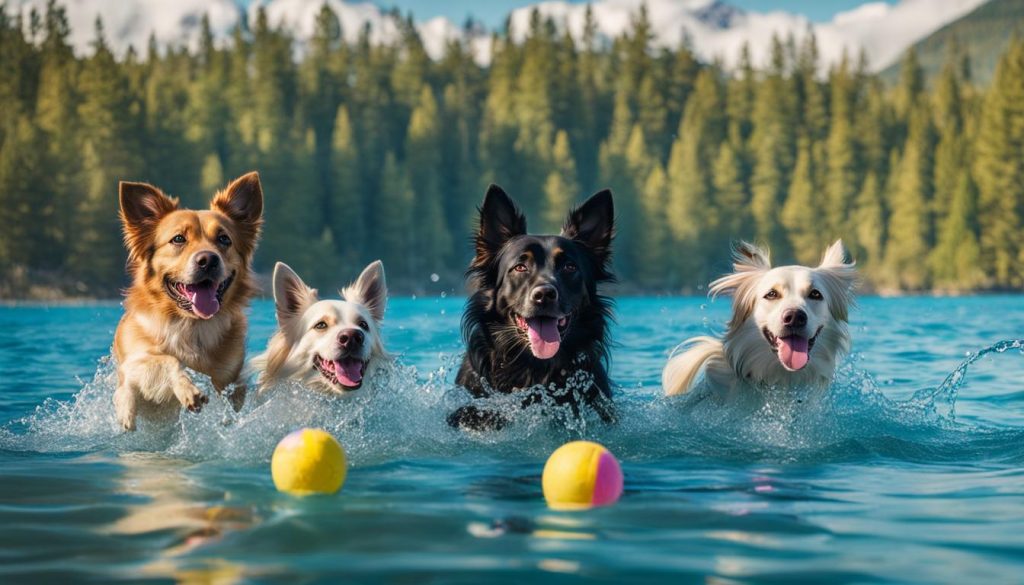
To put it simply, maintaining a healthy balance between hydration and water intake is crucial for your dog’s well-being. By taking necessary precautions and closely monitoring their behavior, you can help ensure a safe and enjoyable swimming experience for your furry friend.
Providing Fresh Water at the Beach
When taking your dog to the beach, ensure they have access to fresh water to prevent them from drinking salt water. Providing ample fresh water will help keep them hydrated, maintain their fluid balance, and avoid the harmful effects of saltwater consumption. Here are some tips on how to provide fresh water for your furry friend at the beach:
- Bring a water bowl: Pack a portable water bowl that can be easily refilled. Look for collapsible bowls that are convenient to carry and won’t take up too much space in your beach bag.
- Regularly refill the water bowl: Dogs can become dehydrated quickly, especially in hot weather, so refill their water bowl regularly. Check the water level frequently and add fresh water as needed.
- Keep the water clean: Ensure the water you provide is clean and free from any sand or debris. Dogs may be reluctant to drink water if it’s dirty, so clean the bowl regularly to encourage them to stay hydrated.
- Offer shade and rest breaks: Along with fresh water, I would advise that you provide your dog with shade and regular breaks from physical activity. This allows them to cool down, rest, and avoid the temptation of drinking saltwater out of thirst.
By following these tips and providing fresh water at the beach, you can help keep your dog hydrated and minimize the risks associated with drinking saltwater. To put it simply, prevention is key to ensuring your dog’s safety and well-being during their beach visit.
Table: Comparison of Different Water Sources
| Fresh Water | Salt Water | |
|---|---|---|
| Taste | Clean and palatable | Contains high levels of salt, unpleasant taste |
| Hydration | Keeps the body hydrated | Can dehydrate the body due to high salt content |
| Health Effects | Supports proper bodily functions | Can cause diarrhea, vomiting, and dehydration |
| Long-term Impact | Essential for overall health and well-being | High salt intake can lead to health complications over time |
Monitoring and Supervising Dogs at the Beach
When taking your dogs to the beach, it is good practice to keep a close eye on them to ensure their safety. Dogs can be curious and may be tempted to drink salt water, which can have harmful effects on their health. By monitoring and supervising your dogs at the beach, you can prevent them from ingesting excessive amounts of salt water and reduce the risk of saltwater poisoning.
One way to monitor your dogs is to regularly check their behavior. If you notice any signs of saltwater poisoning, such as vomiting, diarrhea, muscle tremors, or seizures, you should seek veterinary attention immediately. Additionally, keep an eye out for odd behavior, confusion, lethargy, or non-responsiveness, as these can also indicate saltwater poisoning.
Supervision is key to ensuring the safety of your dogs at the beach. Always provide regular breaks for your dogs to rest and offer them fresh water to drink. This will help prevent dehydration and discourage them from drinking salt water. By supervising your dogs and keeping them hydrated, you can minimize the risks associated with saltwater swimming.
| Monitoring and Supervising Dogs at the Beach |
|---|
| 1. Regularly check your dogs’ behavior for signs of saltwater poisoning |
| 2. Watch out for odd behavior, confusion, and lethargy |
| 3. Provide regular breaks and fresh water for your dogs |
You might want to keep a constant eye on dogs while at the beach to ensure they don’t drink salt water. Regular breaks, shade, and fresh water should be provided to prevent dehydration. Supervision and monitoring can help prevent saltwater poisoning and other water-related risks for dogs.
By implementing these measures, you can enjoy a day at the beach with your furry friends while keeping them safe and healthy. To put it simply, your dogs rely on you to protect them, so be vigilant and take the necessary precautions to ensure their well-being during their beach adventures.
Dangers of Saltwater for Dogs
While many dogs enjoy swimming in saltwater, it’s important for pet owners to be aware of the potential dangers it can pose to their furry friends. Saltwater can be harmful to dogs if consumed in excessive amounts and can lead to various health issues. Some of the key dangers of saltwater for dogs include:
- Dehydration: Consuming large amounts of saltwater can cause dehydration in dogs, as it disrupts the body’s fluid balance and can lead to excessive urination.
- Diarrhea and Vomiting: Ingesting saltwater can irritate a dog’s gastrointestinal tract, resulting in diarrhea and vomiting.
- Bacterial and Toxin Exposure: Saltwater can contain harmful bacteria, algae, or toxins that can cause illnesses in dogs if ingested. These can lead to symptoms such as gastrointestinal problems, lethargy, and even organ damage.
To protect your dog from the dangers of saltwater, take precautions while at the beach or near any bodies of saltwater. This includes closely monitoring your dog’s water consumption, providing access to fresh water at all times, and preventing them from ingesting saltwater by using a leash or practicing recall training. Keeping an eye out for signs of dehydration and other symptoms of saltwater poisoning is also crucial in ensuring your dog’s well-being.
You should also prioritize the safety of your dog and be aware of the potential risks associated with saltwater swimming. By taking necessary precautions and being vigilant, you can help keep your dog healthy and happy during water activities.
Saltwater Safety Tips for Dogs
When it comes to keeping our furry friends safe at the beach, take precautions and be aware of potential risks. Here are some saltwater safety tips to ensure a fun and worry-free experience for dogs:
- Provide fresh water at all times: Dogs can easily become dehydrated when playing in saltwater. Make sure to bring a water bowl and provide access to fresh, clean water throughout the day. This will prevent dogs from drinking saltwater out of thirst.
- Restrict access to saltwater: While dogs may be tempted to take a sip or two from the ocean, it’s best to discourage them from doing so. Saltwater ingestion can lead to dehydration, diarrhea, and other health issues. Keep an eye on your dog and redirect their attention when they get near the water.
- Monitor behavior and symptoms: Pay close attention to your dog’s behavior while at the beach. If you notice any signs of saltwater poisoning such as vomiting, weakness, or muscle tremors, seek veterinary assistance immediately. Early detection and treatment can help prevent serious complications.
- Take regular breaks: Dogs can easily tire themselves out while swimming and playing in the water. Take regular breaks to give them a chance to rest, drink water, and cool down. This will help prevent exhaustion and dehydration.
- Avoid contact with potentially toxic algae: Some bodies of water, including lakes and ponds, may contain harmful algae blooms. These can be toxic to dogs if ingested. Avoid letting your dog swim in water that has visible algae or a strong odor. If you suspect your dog has come into contact with toxic algae, contact a veterinarian immediately.
By following these saltwater safety tips, you can ensure that your dog enjoys a safe and enjoyable time at the beach. To put it simply, their well-being should always be a top priority!
Table: Common Symptoms of Saltwater Poisoning in Dogs
| Symptom | Description |
|---|---|
| Vomiting | Excessive vomiting, often within hours of ingesting saltwater |
| Diarrhea | Loose or watery stools |
| Muscle tremors | Involuntary muscle contractions or twitching |
| Weakness | Lack of energy, decreased strength |
| Seizures | Uncontrolled shaking or convulsions |
these symptoms may vary in severity depending on the amount of saltwater ingested and the individual dog’s tolerance. If you observe any of these symptoms, seek immediate veterinary care for your dog.
Final Thoughts
In conclusion, swimming in salt water can pose risks to dogs. Consuming excessive amounts of salt water can lead to dehydration, diarrhea, and other serious health issues. I highly suggest that you prioritize the well-being of our furry friends and take preventive measures to keep them safe at the beach.
Providing access to fresh water at all times is essential to prevent dogs from drinking salt water. Restricting their access to salt water, monitoring behavior and symptoms of saltwater poisoning, and taking regular breaks can help minimize the risks. Additionally, avoid contact with potentially toxic algae and ensure dogs don’t consume excessive amounts of fresh water while swimming, as this can disrupt their salt and water balance.
By following these saltwater safety tips, we can ensure that our beloved dogs have a fun and safe experience in the water. Let’s remember that their health and well-being should always be our top priority.
FAQ
Is swimming in salt water bad for dogs?
Yes, swimming in salt water can be bad for dogs. Consuming large amounts of salt water can lead to dehydration, diarrhea, and vomiting. It can also expose dogs to harmful bacteria, algae, or toxins. Preventive measures should be taken to ensure the safety of dogs at the beach.
What are the risks of saltwater swimming for dogs?
The risks of saltwater swimming for dogs include dehydration, diarrhea, vomiting, and exposure to harmful bacteria, algae, or toxins. Ingesting excessive salt water can lead to serious health issues and even saltwater poisoning in dogs.
What are the symptoms of saltwater poisoning in dogs?
Symptoms of saltwater poisoning in dogs can include vomiting, weakness, diarrhea, muscle tremors, seizures, odd behavior, confusion, lethargy, and non-responsiveness. If any of these signs are present, contact a veterinarian for guidance.
How is saltwater poisoning in dogs treated?
There is no specific treatment for saltwater poisoning in dogs. Veterinary treatment typically involves restoring the water and electrolyte balance through the administration of IV fluids. Depending on the dog’s condition, the recovery process may involve hospitalization and supportive care.
How can saltwater poisoning be prevented?
Saltwater poisoning can be prevented by providing dogs with ample fresh water at all times and restricting their access to saltwater. Regular breaks, shade, and observation can help prevent excessive consumption of saltwater. It’s also important to ensure dogs don’t drink excessively from freshwater sources.
What are the risks of blue-green algae poisoning?
Blue-green algae, also known as cyanobacteria, can be harmful to dogs in non-flowing freshwater during hot seasons. Ingesting toxins from algae can cause illnesses in dogs. Contact with potentially toxic algae should be avoided, and if contact is suspected, it’s advisable to contact a veterinarian.
Can dogs drink fresh water while swimming?
Yes, dogs can drink fresh water while swimming. However, excessive consumption of fresh water while swimming can disrupt the body’s salt and water balance. If a dog’s behavior changes after swimming, a visit to the vet for bloodwork is recommended.
How can fresh water be provided at the beach?
Fresh water can be provided at the beach by bringing a water bowl that can be refilled continuously. Regular access to fresh, clean water is essential to prevent dehydration and discourage dogs from drinking saltwater.
How should dogs be monitored and supervised at the beach?
Dogs should be constantly monitored and supervised at the beach to prevent them from drinking saltwater. Regular breaks, shade, and access to fresh water should be provided to avoid dehydration and saltwater poisoning. Vigilance can help ensure the safety and well-being of dogs.
What are the dangers of saltwater for dogs?
The dangers of saltwater for dogs include dehydration, diarrhea, vomiting, exposure to harmful bacteria, algae, or toxins, and the risk of saltwater poisoning. Dogs should be protected from these dangers by limiting their exposure to saltwater and preventing them from drinking it.
What are some saltwater safety tips for dogs?
Some saltwater safety tips for dogs include providing fresh water at all times, restricting access to saltwater, monitoring behavior and symptoms of saltwater poisoning, taking regular breaks, and avoiding contact with potentially toxic algae. These measures can help ensure the safety of dogs at the beach.
What is the conclusion regarding saltwater safety for dogs?
Swimming in salt water can be harmful to dogs, as consuming large amounts of saltwater can lead to dehydration, diarrhea, and other health issues. I recommend that you prioritize the well-being of dogs by providing access to fresh water, monitoring their behavior, and taking preventive measures at the beach.


